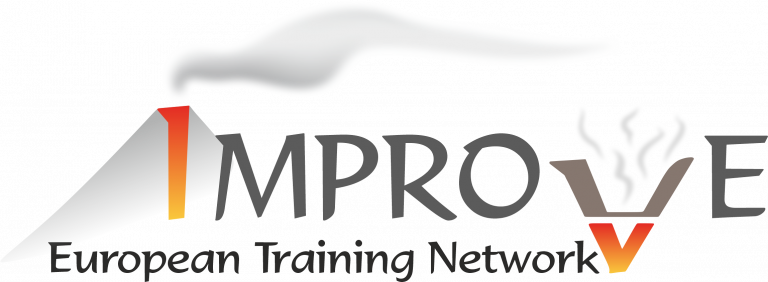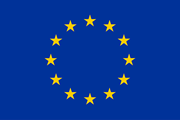Training
The core objective of IMPROVE is to train 15 Early Stage Researchers (ESRs) to research in the field of volcano science as well as to the related industrial developments. The training program is organized at multiple levels from network-wide to individual, and develops through the implementation of personal research plans. IMPROVE is conceived to provide all ESRs with background inter-disciplinary knowledge, and individual ESRs with advanced knowledge of the discipline, methods and techniques specific to their research. IMPROVE is committed to form a generation of scientists who combine genuine expertise with additional skills and leadership capabilities. Such an ambitious objective requires training components beyond purely technical. Alsotaking advantage of industrial partnership and training elements that are common in industry, IMPROVE embeds elements concurring to training on transferable/soft skills:
- science ethscience writing and communication, public speaking, PR and outreach;
- science ethics and Open Science principles and developments (with teaching modules from EPOS and ESA);
- business-oriented science planning and organization;
- team work, interdisciplinary approach, team leadership;
- project scouting, call reading and project writing;
- project management, cost and time planning, value engineering, and work-life balance.
Within the above framework, training within IMPROVE occurs at two different levels:
- network-Wide Training, where both background and advanced training is carried out;
- individual (or local) Training, where individual advanced training is carried out.
Network-wide training
- Two multi-parametric field experiments, at Krafla and Etna, representing real-into-action research and high-level practical training on the following elements:
- planning of survey operations, optimization of the multi-parametric experiment;
- multi-parametric volcano monitoring network organization and functioning, and surveillance operations;
- deployment and use of survey-oriented (Krafla) and monitoring-oriented (Etna) instruments;
- geothermal well logging and flow measurements;
- synchronization, data transmission, data collection and storage;
- real-time data quality evaluation, preliminary data analysis;
- each field experiment will be immediately followed by training on data storage, organization, post-processing and analysis, by using subsets of the same data collected during the experiments so as to provide a collective, expert start to the research activities further developed by the individual ESRs.
- Four theoretical and practicalNetwork Schools on science and technology parallelizing ESRs’ developments in order to maximize learning and applications. Each school (approximately one week) includes modules on transferable and soft skills, and is open to external students (approximately 15 at each school).
- Network School 1:
- Science and technology: geothermal areas, fluid physics and chemistry, fluid flow circulation.
- Transferable/soft skills: meeting presentation, public speaking, PR and outreach.
- Non-academic contribution: geothermal exploration, industry-oriented science developments, environmental impact and public perception (LV).
- Network School 2:
- Science and technology: time series and massive data analysis, signal processing, pattern recognition.
- Transferable/soft skills: data management and policies, database architectures, principles and ethics of Open Science (including specific training modules by ESA and EPOS).
- Non-academic contribution: instrumental technology: planning, engineering, tests, and frontiers (WS, GSL).
- Network School 3:
- Science and technology: geophysical inverse methods, forward numerical modelling.
- Transferable/soft skills: science dissemination, scientific writing.
- Non-academic contribution: project management, team work, team leadership (LV, GSL, WS).
- Network School 4:
- Science and technology: source modelling from integration of multi-disciplinary data and approaches.
- Transferable/soft skills: project scouting, project call reading, project preparation and writing, career planning and goal setting.
- Non-academic contribution: business-oriented science planning and organization, cost and time planning, value engineering, work-life balance (LV, GSL, WS).
- Network School 1:
- Six Specialized Short Courses (SSC) focussing on expert-level training in the scientific areas of ESRs. While all ESRs attend Network Schools, SSCs address network-wide specialized training for individual or groups of ESRs.
- Three ESRs’ Mini-Workshops (MWs), organized by the ESRs themselves and representing topical research check-points and major elements of training giving the ESRs ownership of their educational experience. The ESRs will evaluate their individual and joint advance towards the overall scientific objectives, identify pathways to solutions on key topics, propose further collaborations, define the roadmap to the next network-level check point, and write group reports. ESRs’ MWs involve direct, real and responsible engagement of ESRs as major and primary science developers, and practical training on team work, team leadership, evaluation of individual and group developments, exploitation of interdisciplinary efforts, capability to identify risks and set up strategies for their mitigation, etc.
- Nine Digital Training Modules (DTM) addressing specific issues in the disciplines underpinning ESRs’ investigation, in the form of compact lessons (e.g., seminar format) for repeated listening, digital tutorials, exercises with solutions, specialized software with manuals and exercises, and combinations of the above. Specific DTMs will be proposed by the ESRs themselves based on their effective research needs, and include multi-phase magma rheology, thermo-fluid dynamics, time series analysis, data inversion, ground displacement and seismic wave propagation modelling, satellite data processing, geothermal circulation modelling, and others.
The Network Workshop on “Business and industry-oriented science developments” also includes elements of practical training of ESRs on science-business relationships, and is an effective means of ESRs’ inter-sectorial exposure. Elements of training by non-academic participants at the Network Workshop include:
- business-oriented science planning and organization;
- set up of effective science-business links;
- current and next frontiers in industry-driven underground exploration;
- current and next frontiers in instruments/hardware/software developments;
- exploitation of scientific results for business and societal benefits.
Individual training
- Direct training-through-research by the research group at host institution;
- access to PhD programs, foreseen for all recruited ESRs;
- secondments at Participating Organizations (including non-academic participants);
- access to structured courses at the host and other Beneficiaries’ institutions;
- invitation of external experts as visiting scientists for specialised training-through-research.
All ESRs will be encouraged to participate in international scientific meetings and long-standing external training schools as part of their training, research and dissemination programs, and they are expected to personally present their results as active members of the scientific community. ESRs will be encouraged, trained and supported to apply to research funding calls issued by national and international agencies.
Training-through-research at local level is based on the development of ESRs’ individual research programs in Table 3.1. The IMPROVE consortium provides an exceptional diet of training-through-research tools and instruments appropriate to the objectives of the network (see section 1.1.2 above).



